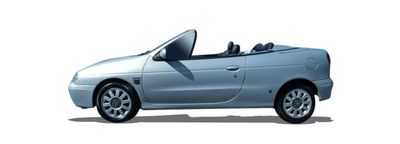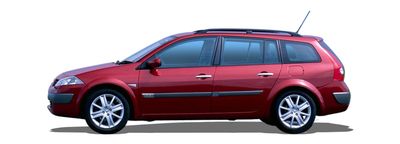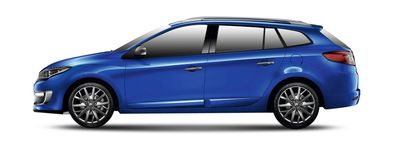Table of Contents
Renault Megane engines
Since its launch in 1995, Renault Megane has become one of the most successful compact cars in Europe, offering a diverse range of Renault Megane engines over four generations. Each generation has brought new technologies and different strengths and weaknesses, with technological evolution ranging from simple naturally aspirated engines to modern turbo and hybrid powertrains.

Renault Megane engines: Generation I (1995-2002)

The first Renault Megane generation was a pioneering period for Renault in the compact car segment and was characterized by robust but still technically simple engines. Mileage varied greatly depending on the engine type: while the tried-and-tested 1.9 dTi diesels easily reached 350,000 to 450,000 kilometers with proper maintenance, the petrol engines often required major repairs to the cylinder head gasket or clutch between 200,000 and 300,000 kilometers. Major engine damage was rare if maintenance was neglected, as the engines were still very simple in design. The absolute top engine of this generation was the 1.9 dTi with 98 hp, which optimally combined power, reliability and economy and was considered one of the best diesel engines of its time.
Renault Megane petrol engines: Generation I (1995-2002)
The Renault Megane petrol engine range mainly comprised naturally aspirated engines without turbocharging. The 1.4 16V with 90 hp was available as the entry-level engine, followed by the 1.6 16V with 110 hp and the powerful 2.0 16V with 150 hp. These Renault Megane engines were characterized by their simplicity and reliability, but had typical problems of the time: cylinder head gasket defects at high mileages, occasional problems with the camshaft adjustment and increased oil consumption in older vehicles. The most powerful Renault Megane petrol engine was the 2.0 16V with 150 hp, which was powerful but had relatively high fuel consumption and occasional problems with knock control.
Renault Megane diesel engines: Generation I (1995-2002)
The Renault Megane diesels were dominated by the 1.9 dTi with various output levels from 80 to 98 hp. There was also the smaller 1.9 D with 64 hp in the early models. The Renault Megane 1.9 dTi with 98 hp developed into the most reliable engine of the entire generation - especially the variants produced from 1997 onwards with an improved injection pump proved to be extremely durable and economical. These Renault Megane dTi engines were not yet equipped with a particulate filter, but already met the Euro 2 standard and offered an excellent combination of performance, consumption and reliability. The characteristic diesel sound and somewhat sluggish response characteristics were typical of the time.
| Renault Megane engine | Power output | Fuel consumption | Typical weaknesses | Rating |
|---|---|---|---|---|
| 1,4 16V | 90 HP | 7.5-8.2 l/100km | Cylinder head gasket, oil consumption | Good |
| 1,6 16V | 110 HP | 8.0-8.8 l/100km | Camshaft adjustment, knock control | Good |
| 2,0 16V | 150 HP | 9.2-10.1 l/100km | High consumption, knock control | Average |
| 1,9 D | 64 HP | 5.8-6.4 l/100km | Loud, little power | Average |
| 1.9 dTi | 80-98 HP | 5.2-5.8 l/100km | Very robust and economical | Very good |

Renault Megane engines: Generation II (2002-2008)

The second Renault Megane generation marked a significant technological leap with the introduction of modern common-rail diesel technology and improved gasoline engines. With proper maintenance, most engines of this generation easily reached 280,000 to 380,000 kilometers, with the 1.5 dCi diesel engines with 106 hp being considered particularly durable. Major engine failures remained rare, but new problems with the more complex electronics and turbochargers became apparent. The absolute pinnacle was the 1.5 dCi with 106 hp - a technical masterpiece with common-rail injection that offered both power and efficiency and is still considered one of Renault's best diesel engines today.
Renault Megane petrol engines: Generation II (2002-2008)
The Renault Megane petrol engine range was completely revised and now included the 1.4 16V with 98 hp, the 1.6 16V with 113 hp and the powerful 2.0 16V with 136 hp. The sporty 2.0 Turbo with 165 hp was also added. These Renault Megane engines proved to be more reliable than their predecessors, with only occasional problems with the ignition coil unit and the mass air flow sensor. However, the Renault Megane 2.0 Turbo developed into the most problematic engine of this generation, with frequent reports of turbocharger damage and intercooling problems during sporty driving. The atmospheric engines, on the other hand, remained very reliable and low-maintenance.
Renault Megane diesel engines: Generation II (2002-2008)
The Renault Megane 1.5 dCi was offered in various power levels from 82 to 106 hp and revolutionized diesel technology at Renault. In addition, there was the larger 1.9 dCi with 120 hp for more power. All Renault Megane diesels had modern common-rail injection, but still without a particulate filter. The Renault Megane 1.5 dCi with 106 hp proved to be the most reliable and efficient engine of this generation, with a test consumption of only 4.2-4.8 liters per 100 km and high reliability - ideal for frequent drivers. The 1.9 dCi showed occasional problems with the turbocharger and injection system, but remained fundamentally reliable.
| Renault Megane engine | Power output | Fuel consumption | Typical weaknesses | Rating |
|---|---|---|---|---|
| 1,4 16V | 98 HP | 7.2-7.8 l/100km | Ignition coils, mass air flow sensor | Good |
| 1,6 16V | 113 HP | 7.8-8.4 l/100km | Occasional sensors | Good |
| 2,0 16V | 136 HP | 8.6-9.2 l/100km | Robust, but thirsty | Good |
| 2.0 Turbo | 165 HP | 9.8-10.6 l/100km | Turbocharger, intercooling | Problematic |
| 1.5 dCi | 82-106 HP | 4.2-4.8 l/100km | Very robust (106 hp variant) | Very good |
| 1.9 dCi | 120 HP | 5.1-5.6 l/100km | Occasional turbocharger | Good |

Renault Megane engines: Generation III (2008-2016)

The third Renault Megane generation saw a further refinement of the engine range, with particulate filters becoming standard on the diesels for the first time. Reliability remained at a high level, with typical mileages of 250,000 to 350,000 kilometers for the tried-and-tested diesel engines. However, the more complex turbo petrol engines and the complex exhaust gas purification system became problematic. The top engine of this generation continued to be the 1.5 dCi, now with 110 hp and Euro 5 standard, which combined proven reliability with modern exhaust technology. Powerful Renault Sport versions with up to 265 hp were also used for the first time.
Renault Megane petrol engines: Generation III (2008-2016)
The Renault Megane petrol engine range included the 1.6 16V with 110 hp, the 2.0 16V with 140 hp and various turbo engines. The new 1.4 TCe with 130 hp and the 1.6 TCe with 180 hp represented modern turbo technology. These Renault Megane TCe engines offered good performance with moderate fuel consumption, but exhibited typical turbo problems: coking of the intake valves, problems with the timing chain and occasional turbocharger damage. The atmospheric 1.6 16V remained the most reliable petrol engine, while the sporty Renault Sport versions with 2.0 Turbo (250-265 hp) offered impressive performance but were prone to overheating and turbocharger damage.
Renault Megane diesel engines: Generation III (2008-2016)
The tried-and-tested Renault Megane 1.5 dCi was further developed and was now available with a particulate filter and in power levels from 90 to 110 hp. The new 1.6 dCi with 130 hp was also added. All Renault Megane diesels met the Euro 5 standard and had modern exhaust aftertreatment. The Renault Megane 1.5 dCi with 110 hp proved to be the pinnacle of diesel technology - extremely economical with fuel consumption of 3.8-4.4 liters, very reliable and with sufficient power for everyday use. The 1.6 dCi occasionally had problems with the particulate filter and the complex exhaust aftertreatment, but remained a good engine in general.
| Renault Megane engine | Performance | Fuel consumption | Typical weaknesses | Rating |
|---|---|---|---|---|
| 1,6 16V | 110 HP | 7.4-8.0 l/100km | Robust, proven | Very good |
| 2,0 16V | 140 HP | 8.2-8.8 l/100km | Reliable, but thirsty | Good |
| 1.4 TCe | 130 HP | 6.8-7.4 l/100km | Valve coking, timing chain | Moderate |
| 1.6 TCe | 180 HP | 7.6-8.2 l/100km | Turbocharger, coking | Problematic |
| 2.0 Turbo RS | 250-265 HP | 10.2-11.4 l/100km | Overheating, turbocharger | Problematic |
| 1.5 dCi | 90-110 HP | 3.8-4.4 l/100km | Very robust (110 hp) | Very good |
| 1.6 dCi | 130 HP | 4.6-5.2 l/100km | Particle filter, exhaust gas aftertreatment | Good |

Renault Megane engines: Generation IV (2016-today)

The current Renault Megane generation relies on modern turbo technology and electrification, with all engines equipped with turbocharging. Reliability varies greatly depending on the engine type: while the smaller TCe engines can reach 200,000 to 300,000 kilometers with proper maintenance, the powerful versions continue to show problems with turbochargers and exhaust aftertreatment. The top-of-the-range engine is the 1.3 TCe with 140 hp, which was developed in cooperation with Mercedes and offers a good balance of performance and reliability. The diesel engines have been significantly reduced as Renault is increasingly focusing on electrification.
Renault Megane petrol engines: Generation IV (2016-today)
The Renault Megane petrol engine range includes the entry-level 1.0 TCe with 100 hp, the 1.3 TCe with 140 and 160 hp and the powerful 1.8 TCe with 280 hp in the RS version. The new 1.3 TCe was developed in collaboration with Mercedes and is significantly more reliable than the previous TCe engines. These Renault Megane engines feature modern technologies such as cylinder deactivation and optimized turbochargers. The 1.0 TCe shows occasional problems with the small turbocharger under high load, while the 1.8 TCe RS remains prone to overheating and turbocharger damage despite its impressive performance.
Renault Megane diesel engines: Generation IV (2016-present)
The diesel range has been greatly reduced and now only includes the 1.5 dCi with 95 and 115 hp. These Renault Megane diesels meet the Euro 6 standard and have SCR catalytic converters and particulate filters. The 1.5 dCi with 115 hp continues the tradition of reliable Renault diesels, but occasionally has problems with the complex exhaust aftertreatment and AdBlue system. Nevertheless, it remains the most economical engine of the generation with a fuel consumption of just 3.6-4.2 liters per 100 km.
Renault Megane hybrid drive: Generation IV (2016-today)
The Renault Megane E-Tech plug-in hybrid with 160 hp system power was introduced in 2020. This combines a 1.6-liter petrol engine with two electric motors and offers an electric range of up to 50 km. The hybrid drive is technically complex but fundamentally reliable, with occasional problems with battery cooling and the complex transmission.
| Renault Megane engine | Power output | Fuel consumption | Typical weaknesses | Rating |
|---|---|---|---|---|
| 1.0 TCe | 100 HP | 5.8-6.4 l/100km | Small turbocharger under load | Average |
| 1.3 TCe | 140-160 HP | 6.2-6.8 l/100km | Significantly improved | Good |
| 1.8 TCe RS | 280 HP | 9.6-10.8 l/100km | Overheating, turbocharger | Problematic |
| 1.5 dCi | 95-115 HP | 3.6-4.2 l/100km | AdBlue system, exhaust gas aftertreatment | Good |
| E-Tech Hybrid | 160 HP | 1.3 l/100km + electricity | Battery cooling, complex transmission | Good |

Conclusion: The best Renault Megane engines of all generations
The development of Renault Megane engines clearly shows the change in automotive technology over three decades. While the early generations impressed with their simplicity and robustness, the more modern generations brought more power and efficiency, but also greater complexity and sometimes reliability problems. The Renault Megane diesel engines remained the most reliable powertrains across all generations, while the turbo petrol engines struggled with similar problems throughout.
- Best Renault Megane gasoline engine:
The Renault Megane 1.6 16V (110 hp, Generation III) combines proven naturally aspirated technology with high reliability and moderate running costs - a perfect balance for everyday drivers.
- Best Renault Megane diesel engine:
The Renault Megane 1.5 dCi (106-110 hp, Generation II & III) offers the best combination of reliability, economy and everyday practicality across all generations and is considered the reference for economical diesel engines.
- Best Renault Megane hybrid engine:
The Renault Megane E-Tech Plug-in Hybrid (160 hp, Generation IV) with its electric range of up to 50 km and low fuel consumption for eco-conscious drivers.
For maintenance and spare parts for all Renault Megane generations, AUTODOC offers a comprehensive range of original and quality spare parts with fast delivery and expert advice.
TOP Products on the topic:















